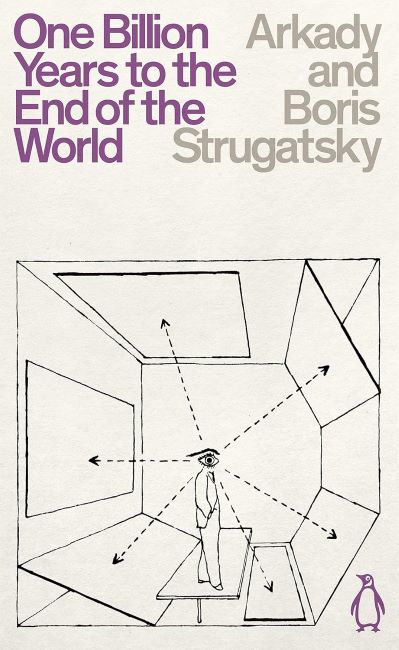
Translated by Antonina W. Bouis

I managed to fit in a post for #VintageSciFiMonth this January in my third encounter with the Strugatsky brothers, after the completely lovable and madcap Monday starts on Saturday from 1964, and philosophical questing of Roadside Picnic from 1972. Also known as Definitely Maybe in the USA, thei novella One Billion Years… was first published in 1977 and this translation dates from 1978. Style-wise, it shares elements of both my previous reads, being ‘definitely’ mad, and ‘maybe’ rather philosophical!
Dmitri Malianov is an astrophysicist who lives in Leningrad with his beloved wife Irina and son Bobchik. As the novel begins, Irina and Bobchik have left the oppressive heat of the city for Odessa on the Black Sea, and Malianov is, he thinks, on the edge of a breakthrough. But the telephone keeps ringing with wrong numbers, the cat, Kaliam, is howling for food, a deliveryman arrives with a crate of booze and stuff that Malianov hadn’t ordered, but he signs for it. The phone rings again, and its his biologist friend Weingarten, who asks what he is working on…
‘What am I working on?’ he asked with gleeful malice. ‘I can tell you in great detail if you like. You’ll be fascinated b it all, I’m sure, bring a biologist and all. Yesterday morning, I finally broke through. It turns out that in the most general assumptions rearding the potential function, my equations of motion have one more integral besides the integral of energy and the integrals of momenta. It’s sort of a generalization of a limited three-field problem. If the equations of motion are given in vector form and then the Hartwig transformation is appled, then the integration is performed for the entire volume, and the whole problem is reduced to integro-differential equations of the Kolmogorov-Feller type.’
Got that?!
Weingarten’s reponse is to tell him a joke about two roosters. It’s a mediocre joke (apparently) and will become a running gag throughout the novel as everyone tells it to everyone else – and we never hear the punchline.
But there’s still no respite from distractions for poor Malianov, a strange and attractive young woman turns up, purportedly a friend of Irina’s and she’ll need putting up overnight.
Excerpt 3 . . . and she changed from her minijumper into a miniskirt and a miniblouse. It must be said that she was a very attractive girl – and Malianov came to the conclusion she had no use for bras at all. She didn’t need a bra; she was in perfect shape without one. He forgot all about the Malianov cavities.
How distracting! (There’s a pay-off to this paragraph much later in the narrative which made me laugh.) His neighbour, the physicist Snegovoi (who they think works for a top secret establishment) also returns and calls in to say hello. By the next day, the girl is gone – and Snegovoi has commited suicide in his own apartment across the way. When a weird guy turns up, looking like the TonTon Macoute in their dark glasses, accusing Malianov of murder, all hope of remembering to record his breakthrough has vanished, as does the chap. A whole host of his colleagues, mainly other scientists, turn up one by one, and they drink their way through the crate of booze, getting more and more philosophical all the while, although the rooster joke is still being passed around. It turns out that Weingarten was also on the verge of a breakthrough, but had been warned off by the same man about it. Paranoia is beginning to set in.
Without any preamble, he announced that a certain extraterrestrial civilization had been watching him, V.A. Weingarten, for quite some time, following his scentific work with attention and anxiety. That the latest work of the aforementioned Weigarten was making them very anxious. That he, the redhead, was empowered to ask V.A. Weingarten to immediately drop the project and destroy all his papers relating to it.
This is not what you expect from a first contact, if that’s what it is. In the Soviet era, there will be no welcoming the human race into a galactic supercivilisation, this isn’t Star Trek. I wonder if the Strugatskys were able to see the original series at all? Instead, the message that comes through is that the regime will stifle creativity and discovery to maintain the status quo. It’s Vecherovsky, the mathematician from upstairs that posits another possibility – the homeostatic universe, incapable of expanding with this knowledge. It all gets very philosophical and even more confusing for the last third of the novel, until one by one they decide what to do, whether to give up or carry on the work somewhere else. For those like Malianov, it’s a stark choice: family or work? It’s singletons like Vecherovsky that have more options, although you’ll recall that Snegovoi committed suicide rather than continue the battle.
You may have noticed how one of my quotes begins, ‘Excerpt’ plus the next number. There are 21 ‘excerpts’ making up the novel’s 11 chapters. It’s a clever device, making the reader think there’s more to the manuscript than presented here, as each excerpt, vignette-style, jumps straight into a different scenario. Not that it’s possible to really read much between the lines, such is the deliberate confusion sown by the Strugatskys.
Although I did appreciate the political allegory being satirised here, I can’t say that One BIllion Years… is my favourite of the three I’ve read by the brothers. It is, undoubtedly an important vintage SF classic and is increasingly thought-provoking the more I think about it. I look forward to reading more by them.
See also what Kaggsy at Shiny, and Chris at Calmgrove thought about this novella.
Source: Own copy from the TBR. BUY at Blackwell’s or Amazon UK via my affiliate links.







